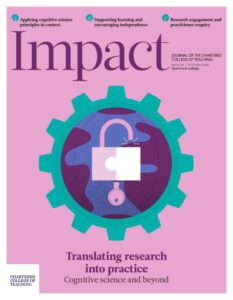Claire Badger, Edward Hackett and Caitlin Whitby, The Godolphin and Latymer School, UK
Discussions with students around effective learning have traditionally been left until they are given dedicated ‘study skills’ sessions as they approach high-stakes examinations. In a recent article, Firth (2022) argued that the foundations for effective learning need to be in place much earlier in a student’s school career in order for them to be effectively equipped with an understanding of how the human mind works, and thus enabling them to make appropriate decisions as they become more autonomous and independent learners. We have run a programme to develop metacognitive skills for a number of years, starting in Year 7 with discussions on memory, before introducing the Learning Scientists’ ‘Six strategies for effective learning’ (Weinstein et al., 2018) in Year 8. These ideas are built on and reinforced during the GCSE years, and in the sixth form we introduce students to the basics o
Join us or sign in now to view the rest of this page
You're viewing this site as a guest, which only allows you to view a limited amount of content.
To view this page and get access to all our resources, join the Chartered College of Teaching (it's free for trainee teachers and half price for ECTs) or log in if you're already a member.











